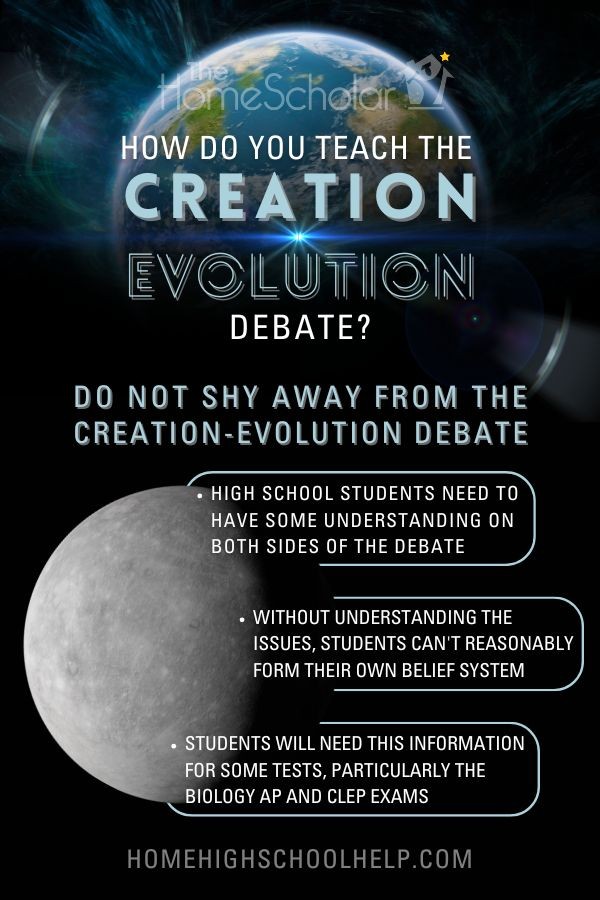How Do You Teach the Creation-Evolution Debate?
Do not shy away from the creation-evolution debate. While it's not critical to teach to younger children, high school students need to have some understanding on both sides of the debate. Whether you are on the creation side or the evolution side, it's essential that your student get teaching from both sides of the debate.
Students need to become informed so they can provide reasoned arguments for their beliefs. Without understanding the issues, they can't reasonably form their own belief system. They need this information for some tests, particularly the biology AP and CLEP exams.
When I was homeschooling, we had numerous books on the topic at home, and we used Apologia science textbooks, which have an explanation of the creationist viewpoint. We didn't shy away from evolution and some of our schoolbooks came from an evolution standpoint. We had MANY discussions in our home about creation, evolution and "intelligent design." My mom made sure that I had both points of view so I could understand the concepts of evolution and explain my own beliefs to others. She told me about her own stance on creation vs evolution clearly, then gave me the materials I needed to decide for myself.
When I was homeschooling, we had numerous books on the topic at home, and we used Apologia science textbooks, which have an explanation of the creationist viewpoint. We didn't shy away from evolution and some of our schoolbooks came from an evolution standpoint. We had MANY discussions in our home about creation, evolution and "intelligent design." My mom made sure that I had both points of view so I could understand the concepts of evolution and explain my own beliefs to others. She told me about her own stance on creation vs evolution clearly, then gave me the materials I needed to decide for myself.
Truth will always prevail!
If you are concerned about teaching evolution in your home, consider carefully the age of your student. At some point you want them to become an adult and learn about a variety of different opinions so they can develop their own. You want them to face the culture with their beliefs firmly attached - beliefs based on fact, rather than ignorance. With information and discussion, you can strengthen your child's ability to stand firm.
You should be able to teach earth science purely from a scientific view. But the study of the earth is usually tangled with a worldview (be that creationist or evolutionist) that is presented as science, and not as the philosophy that it is. For instance, in most geology texts, when you study the makeup of the earth, you also study its age and how it was created. Neither of those things can be proven by science, but it is presented as science. Again, it is one thing to study different types of volcanoes, the makeup of lavas, the effect of volcanoes and it is another matter entirely to discuss the creation of earth where these volcanoes exist. One is a study in science, the other philosophy or history. If all you are studying is the facts, well then, yes, you can study geology without a worldview. But if you intend to discuss the origin of rocks, what created the Ice Age, or hope to understand how volcanoes fit into a very good creation, then you must choose a side. And high school is a great place to make sure that in studying earth science that you delve into the importance of this difference.
You should be able to teach earth science purely from a scientific view. But the study of the earth is usually tangled with a worldview (be that creationist or evolutionist) that is presented as science, and not as the philosophy that it is. For instance, in most geology texts, when you study the makeup of the earth, you also study its age and how it was created. Neither of those things can be proven by science, but it is presented as science. Again, it is one thing to study different types of volcanoes, the makeup of lavas, the effect of volcanoes and it is another matter entirely to discuss the creation of earth where these volcanoes exist. One is a study in science, the other philosophy or history. If all you are studying is the facts, well then, yes, you can study geology without a worldview. But if you intend to discuss the origin of rocks, what created the Ice Age, or hope to understand how volcanoes fit into a very good creation, then you must choose a side. And high school is a great place to make sure that in studying earth science that you delve into the importance of this difference.
Here is how I look at it. You want them to be prepared with the information, so they don't totally do a 180 in college. You don't want them to think it's like Santa Claus, and they can't trust you anymore. So, more information is better. At home, at least you can talk about it and better prepare them to have their beliefs challenged (as they will be at some point, whether they go to college or not). In my opinion, it's better to use mildly evolutionary material and discuss it rather than young-earth-only material and have them flip out when they are first experiencing the other viewpoint without their parents around to guide them.
How have you navigated the creation-evolution debate in your home? Any tidbits of wisdom to share?
Stay Informed
When you subscribe to the blog, we will send you an e-mail when there are new updates on the site so you wouldn't miss them.

 Login
Login









.jpg)

Comments